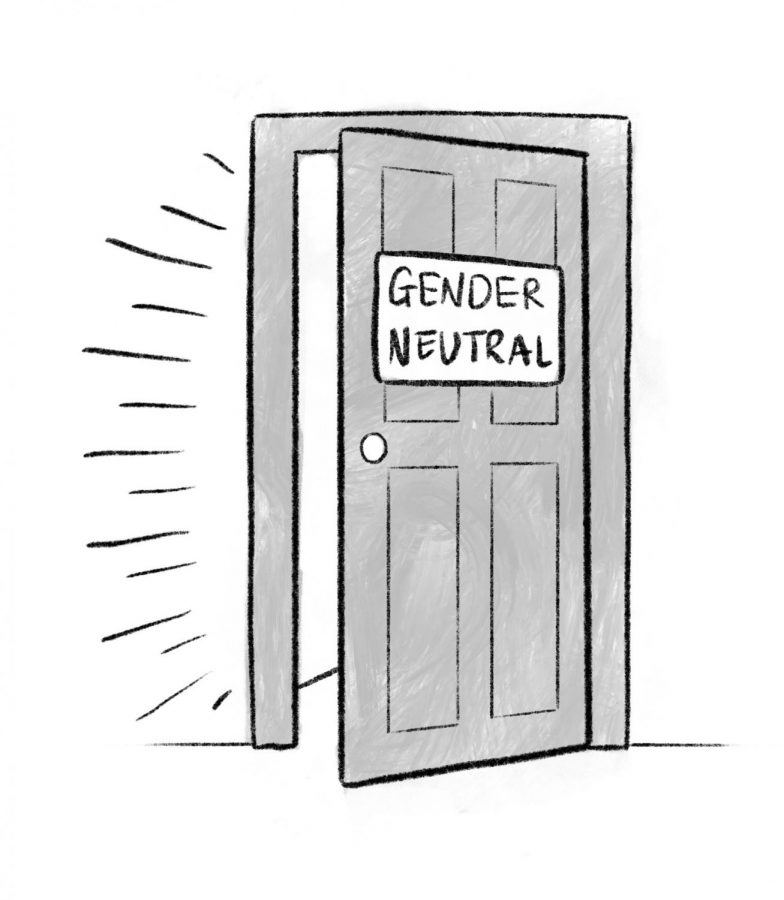Why Lakeside Needs More Gender-Neutral Bathrooms
“The Moore bathrooms on the third floor are to die for.” “Are you out of your mind? The ones in Bliss Hall are so much better!” We’ve all heard the discussions on which bathrooms on campus are the best. Some people pledge their loyalty to the ones inside the WCC while others can’t imagine using any bathrooms beside the ones in St. Nicks. Though it’s fun to speculate on which ones are the best and which should be avoided at all costs, there’s a hidden conversation lurking underneath all these bathroom preferences. As pretty as they are, most bathrooms on campus aren’t accessible to those who identify as non-binary.
The issue of gender-inclusive bathrooms has been heavily discussed in recent years. It became a widespread topic mainly due to the passage of North Carolina’s “bathroom bill” in 2016. This bill banned people from using any other bathroom beside the ones that matched their sex assigned at birth. Furthermore, in February of 2017, the Trump administration revoked the protection that let transgender students use bathrooms of their chosen gender. These actions led to harassment and discrimination towards nonbinary and transgender people. For example, transgender Hamilton actor Suni Reid was denied a gender neutral dressing room, and singer Yungblud was denied having gender-inclusive bathrooms on his tour. Luckily, changes are starting to be made. President Biden has made promises to reverse discriminatory decisions like the ban on the service of transgender people in the military and the elimination of health protections for them.
Lakeside has made many strides in past years to become a more welcoming and inclusive community, including adding gender-inclusive bathrooms of their own. However, out of the vast array of bathrooms, very few are gender-neutral: two in Bliss, one in Moore and two gender-neutral locker rooms in the AAC. Aarabi M. ’25, who identifies as non-binary, says that at their previous school, many gender neutral bathrooms were available to students. However, at Lakeside, Aarabi has been hard-pressed to find one. “Do I know where they are? No. Has anyone mentioned them? No.”
Though Aarabi notes that designating more gender-neutral bathrooms is a practical solution, there are deeper-running issues that also require addressing. “Would I be more comfortable being in a gender-neutral room? Yes. However, the fact that gender-neutral bathrooms are never addressed means that I’d feel really weird and singled out.” Thus, it’s essential to normalize the use of gender-neutral bathrooms and make their locations well-known. In Aarabi’s words, “Don’t make these gender-neutral options stand out, but also don’t sweep them under the rug and never talk about them.”
The Human Rights Campaign Foundation reports that over 60% of students who identify as genderqueer feel unsafe at school, which can be due to feeling unsupported. This is why adding more gender-neutral bathrooms on campus and normalizing them to the student body is so important. Bathrooms that support every student’s gender identity are key for everyone feeling safe and welcome. So, will changes be made by the administration soon? Ms. Wilks says that the administration’s goal is to be “responsive to students’ needs.” Almost 70% of polled students believe that there aren’t enough gender-neutral bathrooms available on campus. Ms. Wilks also says that “all students deserve to feel safe and included at school, and having restroom options that are suitable is an important piece of this goal.” The administration didn’t commit to taking any concrete steps; however, with these ideals in mind, hopefully they’ll take action soon.
In the end, it all comes back to inclusivity and making sure everyone feels safe and welcome. In recent years, the acceptance of nonbinary and transgender people has become more widespread, especially through social media. Our school community has made changes to make sure everyone feels supported no matter how they identify, but there’s certainly room for improvement. We should always seek out new ways to be inclusive.
Lael is disillusioned.
Born May 29th, the universe stopped when Lael entered the world. Per her own recollection (which is “super sharp”),...


Tesfay | Nov 14, 2021 at 9:16 am
Very impressed with this kind of advocacy in a very different but more civilised and accommodative culture. It is a long way in African context.